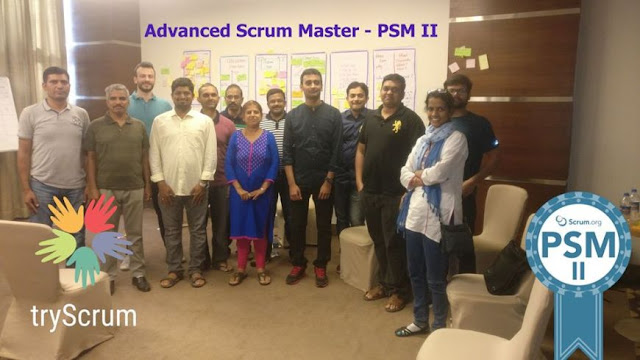What's
the value of (Scrum) certifications? Is there any value? Why should you get
certified? Is it even necessary?
Discussion
Definitely
an interesting topic and when you start "googling" it, you'll stumble
upon many yeses, no, yes, no, maybe debates.
For
this blog, I'll be focusing on Scrum.org. So, let's take a step back again.
What's the value of scrum certification
course Bangalore? Is there any value? Why should you get certified?
I
would say, it depends on your intentions. If your intention is only to get the
Scrum certifications, then I'm sorry, there is no value there. Perhaps you
should not even be doing it then Why? Because you're doing it for the wrong
reasons!
Then
what should be the reason?
But,
if you're intrinsically motivated to help your organization become Agile by
adopting Scrum, improving the profession of product delivery with Scrum and be
an ambassador of change then yes, there is definitely value in getting yourself
certified.
Knowing
Scrum vs. Understanding Scrum
Every
Scrum role, event, and artifact has an important purpose. What does empiricism
truly mean? What's the power of bottom-up intelligence through self-organized
cross-functional teams? How to use the Scrum Values as a compass? What's
validate-learning? What do we mean by value? Know where you can bend the rules
without breaking the principles. All of this, Scrum.org has a clear vision when
it comes to the usage of Scrum. The fundamental distinction between knowing
Scrum and understanding Scrum.
Scrum
grew lighter and lighter. Less complete, less perfect in a way. Prescriptions,
situational practices and techniques were gradually removed from the official
definition of Scrum as it is documented in the Scrum Guide. Scrum turned into
the framework that it was always designed to be. - Gunther Verheyen
Conclusion
Experience
is not equal to knowledge. Having the knowledge doesn't always mean you
understand it.
Scrum
is a simple lightweight understandable framework, but extremely difficult to
master.
Scrum.org
training and exams (especially the advanced ones such as PSM III and PSPO II)
consists of the case studies in essay format, where your in-depth understanding
of the application and practices of Scrum (Scrum Master, Developer, Product
Ownership, Scaling), the values and underlying principles in a variety of complex
team and organizational situations are being challenged. In my opinion, a
verification of this understanding is valuable!
It's
clear that passing the exams doesn't make you an expert yet:
First,
work on understanding Scrum. A training could be a great way to kickstart this
process.
Once
you have the proper understanding, you can start exploring Scrum to gain
experience.
When
you have the proper understanding and start applying Scrum in real life, you'll
experience the challenges and highlights. Don't walk away from challenges, but
face them! Eventually, knowledge will come.
So,
what were your intentions when you decided to become Scrum certified?
Resource:
https://www.scrum.org/resources/blog/value-scrum-certifications












0 comments:
Post a Comment